Fleurs du Mal Magazine


Hij bladert door de mappen met foto’s. In tien mappen heeft hij de foto’s van de molen en de meelfabriek verzameld.
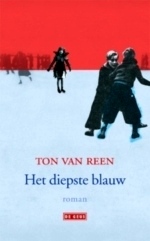 Ook foto’s van de mensen in het dorp, want iedereen werkte bij de fabriek. Een eeuw lang heeft de fabriek het leven in het dorp beheerst.
Ook foto’s van de mensen in het dorp, want iedereen werkte bij de fabriek. Een eeuw lang heeft de fabriek het leven in het dorp beheerst.
Elke dag werkt hij een paar uur aan de bijschriften. Het is een hels karwei om de namen op te sporen van vergeten mensen. Hoe verder terug in de tijd, hoe meer het lijkt of de mensen van dag tot dag hebben geleefd. Ze schreven weinig op. De boekhouding van de weduwe Hubben-Houba was niet meer dan een aantekenboekje. De tien werknemers hadden alleen voornamen. Hoe wist de weduwe het onderscheid tussen de drie Jannen en de twee Jozefs?
Vervelend is dat hij in zijn roes weer een map door elkaar gehusseld heeft. Te veel pillen geslikt voor verwijding van de bloedvaten, om meer bloed naar zijn hersenen te sturen. Het gevolg is dat hij alleen maar een vage herinnering aan de voorgaande dagen heeft. Dagen dat hij niet buiten is geweest. Niet eens beneden. Niet is aangekleed. Gelukkig hebben de medicijnen geholpen en is hij weer helder. Hij moet in zijn archief gezocht hebben naar foto’s die er niet zijn. Hij weet het nog vaag.
Soms is hij op zoek naar foto’s van Jacob.
Als hij helder is weet hij dat er geen foto’s van Jacob zijn.
Ton van Reen: Het diepste blauw (040)
wordt vervolgd
fleursdumal.nl magazine
More in: - Book Stories, - Het diepste blauw, Archive Q-R, Reen, Ton van
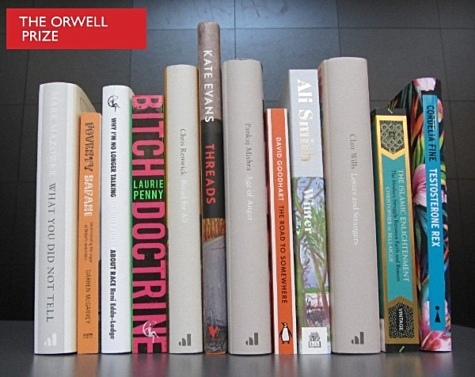
The longlist of The Orwell Prize for Books 2018 features historical writing, fiction and for the first time a graphic novel.
The Islamic Enlightenment: The Modern Struggle Between Faith and Reason, Christopher de Bellaigue (Bodley Head). An absorbing account of the political and social reformations that transformed the lands of Islam in the nineteenth and early twentieth centuries)
Why I’m No Longer Talking to White People about Race, Reni Eddo-Lodge (Bloomsbury). A book on racial inequalities, exploring issues from eradicated black history to the political purpose of white dominance, whitewashed feminism to the inextricable link between class and race
 Threads from the Refugee Crisis, Kate Evans (Verso). Combining the techniques of eyewitness reportage with the medium of comic-book storytelling, Evans has produced a compelling view into the life of asylum seekers living in Calais’s ‘Jungle’.
Threads from the Refugee Crisis, Kate Evans (Verso). Combining the techniques of eyewitness reportage with the medium of comic-book storytelling, Evans has produced a compelling view into the life of asylum seekers living in Calais’s ‘Jungle’.
Testosterone Rex, Cordelia Fine (Icon Books). A book explaining why past and present sex roles are only serving suggestions for the future. It reveals a much more dynamic situation through an entertaining and well-documented exploration of the latest research that draws on evolutionary science, psychology, neuroscience, endocrinology, and philosophy.
The Road to Somewhere – The Populist Revolt and the Future of Politics, David Goodhart (Hurst Publishers). An exposition of how the political elites have failed their societies. This investigation into the new global politics reveals how the Somewhere backlash is a democratic response to the dominance of Anywhere interests, in everything from mass higher education to mass immigration.
What You Did Not Tell, Mark Mazower (Allen Lane). In the centenary of the Russian Revolution, What You Did Not Tell recounts a brand of socialism erased from memory – humanistic, impassioned, and broad-ranging in its sympathies. But it also explores the unexpected happiness that may await history’s losers, the power of friendship, and the love of place.
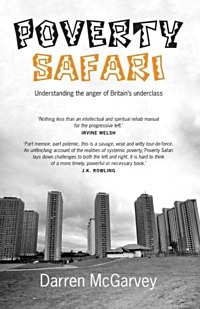 Poverty Safari, Darren McGarvey (Luath Press). People from deprived communities all across Britain feel misunderstood and unheard. Darren McGarvey, aka Loki, gives voice to their feelings and concerns, and anger that is spilling over.
Poverty Safari, Darren McGarvey (Luath Press). People from deprived communities all across Britain feel misunderstood and unheard. Darren McGarvey, aka Loki, gives voice to their feelings and concerns, and anger that is spilling over.
Age of Anger: A History of the Present, Pankaj Mishra (Allen Lane). How can we explain the origins of the great wave of paranoid hatreds that seem inescapable in our close-knit world – from American ‘shooters’ and ISIS to Trump? Pankaj Mishra answers our bewilderment by casting his gaze back to the eighteenth century, before leading us to the present.
Bitch Doctrine, Laurie Penny (Bloomsbury) Bread for All:The Origins of the Welfare State, Chris Renwick (Allen Lane). This collection of Laurie Penny’s writing covers everything from the shock of Donald Trump’s election and the victories of the far right, to online harassment and the transgender rights movement. These darkly humorous articles provoke challenging conversations about the definitive social issues of today.
Winter, Ali Smith (Hamish Hamilton). In the second novel in her Seasonal cycle, Smith’s shape-shifting quartet of novels casts a merry eye over a bleak post-truth era with a story rooted in history, memory and warmth, its taproot deep in the evergreens: art, love, laughter.
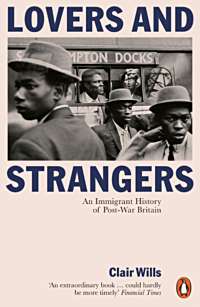 Lovers and Strangers: An Immigrant History of Post-War Britain, Clair Wills (Allen Lane). Clair Wills’ book brings to life the incredible diversity and strangeness of the migrant experience. She introduces us to lovers, scroungers, dancers, homeowners, teaches, drinkers, carers and many more to show the opportunities and excitement as much as the humiliation and poverty that could be part of the new arrivals’ experience.
Lovers and Strangers: An Immigrant History of Post-War Britain, Clair Wills (Allen Lane). Clair Wills’ book brings to life the incredible diversity and strangeness of the migrant experience. She introduces us to lovers, scroungers, dancers, homeowners, teaches, drinkers, carers and many more to show the opportunities and excitement as much as the humiliation and poverty that could be part of the new arrivals’ experience.
The judges for the Orwell Prize for Books are politician, academic and journalist Andrew Adonis (Chair), Literary Journalist and Artistic Director of Words and Literature of the Bath Festival, Alex Clark, author Kit de Waal, and Lorien Kite, Deputy Life & Arts Editor for the Financial Times.
The shortlist for The Orwell Prize for Books will be announced at The Bath Festival on 18th May. The winner of the £3000 prize will be unveiled on 25th June 2018 at The RSA, together with the winner of The Orwell Prize for Journalismand The Orwell Prize for Exposing Britain’s Social Evils.
Previous winners of the Orwell Prize for Books include John Bew for his biography of Clement Attlee (2017), Raja Shehadeh (2008), Alan Johnson (2014), and Andrea GiThe judges for the Orwell Prize for Booksllies (2010).
The Orwell Prize 2018 is for work published in the calendar year 2018. For more details and rules of entry please visit www.orwellfoundation.com
orwell-prize 2018
fleursdumal.nl magazine
More in: - Book Lovers, - Book News, Art & Literature News, Awards & Prizes, George Orwell, PRESS & PUBLISHING

Helas
To drift with every passion till my soul
Is a stringed lute on which all winds can play,
Is it for this that I have given away
Mine ancient wisdom, and austere control?
Methinks my life is a twice-written scroll
Scrawled over on some boyish holiday
With idle songs for pipe and virelay,
Which do but mar the secret of the whole.
Surely there was a time I might have trod
The sunlit heights, and from life’s dissonance
Struck one clear chord to reach the ears of God.
Is that time dead? lo! with a little rod
I did but touch the honey of romance
And must I lose a soul’s inheritance?
Oscar Wilde
(1854 – 1900)
Helas
fleursdumal.nl magazine
More in: Archive W-X, Wilde, Oscar, Wilde, Oscar
Al vroeg in de ochtend vertrekt zijn vader in de zwarte Ford naar de boeren, om graan in te kopen voor de meelfabriek.
 Zijn werk kost zweet, bloed en tranen. Directeur Frits schrijft zijn vader voor hoeveel hij uit mag geven en daar mag hij geen cent bovenop doen.
Zijn werk kost zweet, bloed en tranen. Directeur Frits schrijft zijn vader voor hoeveel hij uit mag geven en daar mag hij geen cent bovenop doen.
`Onderhandelen met boeren over een prijs is bijna onmogelijk’, zegt vader. `Ze willen het onderste uit de kan. De room is voor de boeren en toch voelen ze zich altijd bestolen.’
Wat vader over de boeren vertelt, is precies het tegenovergestelde van wat grootvader Bernhard erover vertelt. Die zegt altijd dat de boeren te weinig krijgen.
Vader zwerft door het hele land. Bijna elke week brengt hij handdoeken mee waarop de namen van de hotels zijn geborduurd. Moeder is daar kwaad over, omdat hij ze pikt, maar hij zegt dat hij erom vraagt en ze krijgt als souvenirs. Ze hebben er een kast vol van, maar moeder gebruikt ze nooit.
Vader is alleen op zondag thuis, maar ook dan heeft hij geen tijd voor Mels. Dan gaat hij naar de hoogmis en daarna kaarten in het café. Daar is dan ook de jonge directeur Frans-Joseph, die een kwade dronk heeft. In het café gaat hij net zo tekeer tegen zijn kaartvrienden als door de week tegen de arbeiders. Niemand durft tegen hem te zeggen dat ze liever zonder hem kaarten. Zeker Mels’ vader niet.
`Rot maar op’, hoeft Frans-Joseph maar te zeggen. `Rot jij maar op.’ Zoals hij dat soms tegen mensen zegt als hun gezicht hem niet aanstaat of hun werk hem niet bevalt. Ze moeten altijd oppassen voor de directeuren.
Het kaarten eindigt meestal met ruzie. Vaak gaat Frans-Joseph met herrie naar huis. Als vader na zo’n kaartpartij thuiskomt, zegt hij geen stom woord en heeft hij hoofdpijn.
Soms zoekt Mels zijn vader op in het café. Dan krijgt hij limonade. Maar daar is het hem niet om te doen. Hij wil hem alleen maar vragen om naar huis te komen, omdat moeder op hem zit te wachten. Vader blijft altijd net zo lang in het café als de directeur en vaak is dat tot aan het avondeten.
Slechts op een enkele zondag, als Frans-Joseph op reis is of gewoon op vakantie, gaan ze met het gezin een stukje rijden. Na het middagdutje van vader. Nooit ver. Vader rijdt niet graag op zondag. Mels vindt die korte ritjes niet erg. Later haalt hij de schade wel in. Dan koopt hij zelf een Ford of een Borgward Isabella. Net zo’n grote zwarte bak als directeur Frits heeft.
Ton van Reen: Het diepste blauw (039)
wordt vervolgd
fleursdumal.nl magazine
More in: - Book Stories, - Het diepste blauw, Archive Q-R, Reen, Ton van
De Provincie West-Vlaanderen herdenkt van 2014 tot en met 2018 op culturele wijze 100 jaar Groote Oorlog. Deze eigentijdse, toekomstgerichte en multidisciplinaire herdenking kreeg de naam ‘GoneWest’.
GoneWest verbindt talloze levensverhalen met gedegen historisch besef en ontsluit deze kleine en grote verhalen via muziek-, dans-, theaterevenementen, literatuur en beeldende kunst.
“…because his brother had gone west, raved at the bleeding war; his rampant grief moaned, shouted, sobbed, and choked, while he was kneeling half-naked on the floor. In my belief such men have lost all patriotic feeling.” Siegfried Sassoon
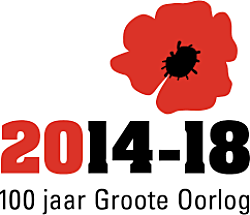 ‘To go west’, een Engelse uitdrukking, die zoveel betekent als sterven, kreeg tijdens de Eerste Wereldoorlog een bijkomende betekenis mee. Het ten westen gaan van de doden, met de ondergaande zon mee, werd aan het geallieerde front meer dan zomaar een metafoor. Britten, Fransen en Belgen bezetten dan ook het westelijke deel van dat Westelijke Front, dat van het noorden naar het zuiden West-Vlaanderen en Noord-Frankrijk doorsneed. Hun gesneuvelden en gekwetsten brachten ze daarmee letterlijk naar het westen toe.
‘To go west’, een Engelse uitdrukking, die zoveel betekent als sterven, kreeg tijdens de Eerste Wereldoorlog een bijkomende betekenis mee. Het ten westen gaan van de doden, met de ondergaande zon mee, werd aan het geallieerde front meer dan zomaar een metafoor. Britten, Fransen en Belgen bezetten dan ook het westelijke deel van dat Westelijke Front, dat van het noorden naar het zuiden West-Vlaanderen en Noord-Frankrijk doorsneed. Hun gesneuvelden en gekwetsten brachten ze daarmee letterlijk naar het westen toe.
Expo 600.000 beeldjes – 600.000 namen
Ervaar vanaf april 2018 de indrukwekkende land-artinstallatie ComingWorldRememberMe in het provinciedomein De Palingbeek in Ieper.
Deze installatie strekt zich uit over het niemandsland en The Bluff, een van de zwaarst bevochten plekken van de Eerste Wereldoorlog. De 600.000 beeldjes krijgen een plaats tussen drie grote kunstwerken van kunstenaar Koen Vanmechelen.
Tienduizenden mensen uit Vlaanderen en de rest van de wereld hielpen ComingWordRememberMe tot stand komen: samen maakten ze 600.000 beeldjes. Bij elk beeldje hoort een dog tag, het universele identificatiesysteem voor frontsoldaten. De dog tags combineren telkens de naam van een WOI-slachtoffer met de naam van een maker van een beeldje. Elke dog tag verbindt zo letterlijk het verleden met het heden.
Een doorzichtig werk van kunstenaar Koen Vanmechelen biedt plaats aan de 600.000 dog tags. De namen van de oorlogsslachtoffers komen uit ‘De Namenlijst’. Het In Flanders Fields Museum in Ieper stelde deze digitale lijst met alle slachtoffers van WOI in België samen.
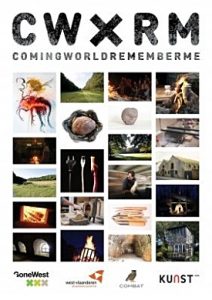
Het doorzichtige kunstwerk met de 600.000 dog tags krijgt een plaats in het paviljoen aan de start van het wandelparcours rond de land-artinstallatie. Het verenigt er letterlijk de verschillende nationaliteiten en generaties in de herdenking. Het engagement van al de betrokken mensen maakt van de land-art-installatie een grens- en generatie-overschrijdend symbool van vrede.
Tot eind mei 2018 kunt u bij uw bezoek aan het paviljoen een wandeling starten. Langs een deel van het wandeltraject hoort u op verschillende rustpunten oorlogspoëzie. De wandeling eindigt op de uitkijkbrug met een bijzonder uitzicht over de indrukwekkende land-artinstallatie.
Door het karakter van de locatie kan de volledige land-artinstallatie maar tijdelijk in het provinciaal domein De Palingbeek blijven staan. De dog-tags met de namen van oorlogsslachtoffers en peters en meters krijgen wel een definitieve plaats op het Niemandsland.
De organisatoren streven ernaar om de beeldjes na afloop van de expo op een respectvolle manier te verwijderen. Eind 2018 krijgen eerst alle peters en meters de kans om een beeldje uit de installatie op te halen. Voor de resterende beeldjes zoeken de initiatiefnemers een museale bestemming op verschillende locaties, zowel in België als in het buitenland.

Expo 600.000 beeldjes – 600.000 namen
Tot eind mei 2018
Koen Vanmechelen
Het oeuvre van kunstenaar Koen Vanmechelen is een voortdurende zoektocht naar de universele waarheid van ons bestaan. Met projecten als ‘The Cosmopolitan Chicken Project’, ‘The Open University of Diversity’ en ‘The Accident’, exploreert Koen Vanmechelen de terreinen van diversiteit en identiteit. Hij wordt hiervoor naar inhoud en verbeelding sinds jaren internationaal gerespecteerd. Het werk van Vanmechelen is een ode aan het leven en is bestemd voor de nieuwe kosmopolitische mens. Hij koestert culturele verschillen. Is ruimdenkend. Zoekt naar begrip van het andere. Leeft van constructieve confrontatie. Verlegt grenzen. Is uit op symbiose. Probeert de beladen begrippen ‘identiteit’ en ‘diversiteit’ te herdefiniëren in een wereld die ooit grenzeloos was en het ooit weer zal worden.Een filosofie die perfect aansluit bij het verhaal dat ComingWorldRememberMe wil vertellen dus.
Meer informatie op website: http://www.koenvanmechelen.be & https://www.gonewest.be/
GONEWEST: Artistieke herdenking 100 jaar Groote Oorlog in West-Vlaanderen
fleursdumal.nl magazine
More in: *War Poetry Archive, Art & Literature News, FDM Art Gallery, Galerie des Morts, Historia Belgica, Land Art, WAR & PEACE

Pierre-Jean de Béranger
La bacchante
Cher amant, je cède à tes désirs ;
De champagne enivre Julie.
Inventons, s’il se peut, des plaisirs
Des amours épuisons la folie.
Verse-moi ce joyeux poison ;
Mais surtout bois à ta maîtresse :
Je rougirais de mon ivresse
Si tu conservais ta raison.
Vois déjà briller dans mes regards
Tout le feu dont mon sang bouillonne.
Sur ton lit, de mes cheveux épars,
Fleur à fleur vois tomber ma couronne.
Le cristal vient de se briser :
Dieu ! baise ma gorge brûlante,
Et taris l’écume enivrante
Dont tu le plais à l’arroser.
Verse encore ; mais pourquoi ces atours
Entre tes baisers et mes charmes ?
Romps ces nœuds, oui, romps-les pour toujours,
Ma pudeur ne connaît plus d’alarmes.
Presse en tes bras mes charmes nus.
Ah ! je sens redoubler mon être !
A l’ardeur qu’en moi tu fais naître,
Ton ardeur ne suffira plus.
Dans mes bras tombe enfin à ton tour ;
Mais, hélas ! tes baisers languissent.
Ne bois plus, et garde à mon amour
Ce nectar où tes feux s’amortissent.
De mes désirs mal apaisés,
Ingrat, si tu pouvais te plaindre,
J’aurai du moins pour les éteindre
Le vin où je les ai puisés.
Pierre-Jean de Béranger (1780-1857)
La bacchante
Toutes les chansons de Béranger (1843)
fleursdumal.nl magazine
More in: Archive A-B, Béranger, Pierre-Jean de
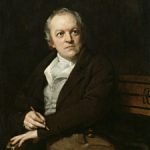
The Angel poetry
I Dreamt a Dream! what can it mean?
And that I was a maiden Queen:
Guarded by an Angel mild;
Witless woe, was neer beguil’d!
And I wept both night and day
And he wip’d my tears away
And I wept both day and night
And hid from him my hearts delight
So he took his wings and fled:
Then the morn blush’d rosy red:
I dried my tears & armd my fears,
With ten thousand shields and spears.
Soon my Angel came again;
I was arm’d, he came in vain:
For the time of youth was fled
And grey hairs were on my head
William Blake (1757 – 1827)
Poem: The Angel poem
fleursdumal.nl magazine
More in: Archive A-B, Blake, William
Hij hoort ritselen, boven het plafond. Om muizen stil te krijgen, hoef je alleen maar aan ze te denken. Ze lezen je gedachten. Ze hebben er iets voor in hun hersenen, een zintuig dat hun zegt: pas op voor mensen, mensen zijn moordenaars.
 Hij kijkt weer in de spiegel. Het weinige, overgebleven haar. Hij is heel anders dan hoe hij zichzelf zou willen zien. Ouder. Moe. Pafferig. Hij wendt de blik af. Als hij al niet zonder afkeer naar zichzelf kan kijken, hoe kan hij dan van anderen verlangen dat ze hem wél liefdevol tegemoet treden? Waarom is de buitenkant van zijn hoofd zo anders dan wat er in de binnenkant leeft? In zijn hoofd is hij jong, soms een kind en rent hij rond, onvermoeibaar. Vroeger heeft hij zich nooit kunnen voorstellen dat hij zo oud zou worden als zijn vader, laat staan als zijn grootvader. Maar in jaren heeft hij zijn vader allang overleefd. Zijn grootvader Bernhard heeft hij al bijna ingehaald. Zo oud als grootvader Rudolf wil hij niet eens worden. Het was beter geweest dat hij net zo jong was gestorven als zijn vader, dan had hij deze ellendige tijd niet hoeven mee te maken. Wie vroeg sterft, laat een hoop ellende aan zich voorbijgaan. Als zijn vader oud was geworden, zou hij alleen maar ongelukkig zijn geweest.
Hij kijkt weer in de spiegel. Het weinige, overgebleven haar. Hij is heel anders dan hoe hij zichzelf zou willen zien. Ouder. Moe. Pafferig. Hij wendt de blik af. Als hij al niet zonder afkeer naar zichzelf kan kijken, hoe kan hij dan van anderen verlangen dat ze hem wél liefdevol tegemoet treden? Waarom is de buitenkant van zijn hoofd zo anders dan wat er in de binnenkant leeft? In zijn hoofd is hij jong, soms een kind en rent hij rond, onvermoeibaar. Vroeger heeft hij zich nooit kunnen voorstellen dat hij zo oud zou worden als zijn vader, laat staan als zijn grootvader. Maar in jaren heeft hij zijn vader allang overleefd. Zijn grootvader Bernhard heeft hij al bijna ingehaald. Zo oud als grootvader Rudolf wil hij niet eens worden. Het was beter geweest dat hij net zo jong was gestorven als zijn vader, dan had hij deze ellendige tijd niet hoeven mee te maken. Wie vroeg sterft, laat een hoop ellende aan zich voorbijgaan. Als zijn vader oud was geworden, zou hij alleen maar ongelukkig zijn geweest.
Ton van Reen: Het diepste blauw (038)
wordt vervolgd
fleursdumal.nl magazine
More in: - Book Stories, - Het diepste blauw, Archive Q-R, Reen, Ton van
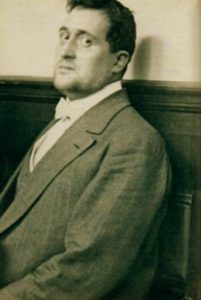
Hôtels
La chambre est veuve
Chacun pour soi
Présence neuve
On paye au mois
Le patron doute
Payera-t-on
Je tourne en route
Comme un toton
Le bruit des fiacres
Mon voisin laid
Qui fume un âcre
Tabac anglais
Ô La Vallière
Qui boite et rit
De mes prières
Table de nuit
Et tous ensemble
Dans cet hôtel
Savons la langue
Comme à Babel
Fermons nos portes
À double tour
Chacun apporte
Son seul amour
Guillaume Apollinaire
(1880 – 1918)
Hôtels
Alcools – poèmes 1898-1913
Paris : Éditions de la Nouvelle Revue française,
troisième édition, 1920
fleursdumal.nl magazine
More in: *Concrete + Visual Poetry A-E, Apollinaire, Guillaume, Archive A-B, Guillaume Apollinaire
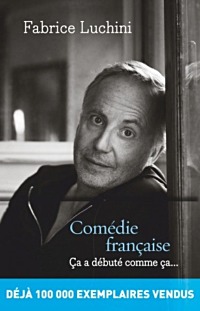 Il nous a fait redécouvrir La Fontaine, Rimbaud et Céline.
Il nous a fait redécouvrir La Fontaine, Rimbaud et Céline.
Il incarne l’esprit et le panache de la langue française. En prose, en vers et même en verlan, il a donné sa voix à d’immenses auteurs, auxquels il sait faire respirer l’air de notre temps – en racontant la fureur du Misanthrope à l’ère du téléphone portable, ou la sensualité de “La Laitière et le pot au lait” sur l’air d’une publicité pour Dim.
Il a quitté l’école à quatorze ans pour devenir apprenti coiffeur. Il est aujourd’hui l’un de nos plus grands comédiens, célébré pour ses lectures-spectacles, couronné par la Mostra de Venise pour son rôle dans son dernier film, L’Hermine.
Dans son autobiographie, Fabrice Luchini livre le récit d’une vie placée sous le signe de la littérature, à la recherche de la note parfaite.
Fabrice Luchini est né à Paris en 1951. Lancé par Philippe Labro et Éric Rohmer alors qu’il est encore apprenti coiffeur, révélé par le film La Discrète, en 1990, il est l’un des plus grands acteurs français. Il donne depuis plus de vingt ans des spectacles, désormais entrés dans la légende, consacrés aux auteurs qu’il aime. Il a été sacré meilleur acteur à la Mostra de Venise pour son rôle dans L’Hermine de Christian Vincent. Comédie française est son premier livre.
Fabrice Luchini
Comédie française
Ça a débuté comme ça
Paru le 02/03/2016
Genre: Essais littéraires
256 pages
135 x 210 mm
Broché
ISBN-10: 2081379171
ISBN-13: 978-2081379176
€19,00
Ed. Flammarion
new books
fleursdumal.nl magazine
More in: - Book Stories, Archive K-L, Art & Literature News, La Fontaine, Jean de, Louis-Ferdinand Céline, Rimbaud, Arthur, THEATRE
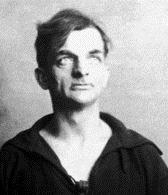
Ab Kopenhagen
Kein Kaviar, kein’ Kokosnuß,
Kein Obst noch Weinbergschnecken –
Am Tage, da ich reisen muß,
Da will mir nichts mehr schmecken.
Lebe wohl, du schönes Kopenhagen!
Wie ist das schlimm: Entbehrlich sein.
Was kümmert dich im Grunde mein
Schweres Herz und mein leerer Magen.
Der mein Gepäck zur Bahn gebracht,
Der Mann kennt keine Tränen.
Im Gegenteil: er grüßt und lacht
Vergnügt. So sind die Dänen.
Wie stets nach dreißig Tagen
Bricht eine neue Welt entzwei.
Mich hat ein Mädchen hier umgarnt,
Ein Wunderweib! – Vorbei! Vorbei!
Nun sitz ich still im Wagen.
Jedoch ich will nicht klagen.
Vor Taschendieben wird gewarnt.
Lebe wohl, du schönes Kopenhagen.
Joachim Ringelnatz
(1883 – 1934)
Ab Kopenhagen
fleursdumal.nl magazine
More in: Archive Q-R, Joachim Ringelnatz
In The Mathematics of the Breath and the Way, Charles Bukowski considers the art of writing, and the art of living as writer.
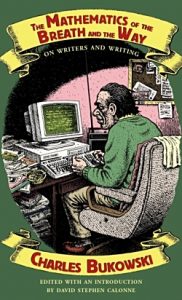 Bringing together a variety of previously uncollected stories, columns, reviews, introductions, and interviews, Mathematics finds him approaching the dynamics of his chosen profession with cynical aplomb, deflating pretentions and tearing down idols armed with only a typewriter and a bottle of beer.
Bringing together a variety of previously uncollected stories, columns, reviews, introductions, and interviews, Mathematics finds him approaching the dynamics of his chosen profession with cynical aplomb, deflating pretentions and tearing down idols armed with only a typewriter and a bottle of beer.
Beginning with the title piece—a serious manifesto disguised as off-handed remarks en route to the racetrack—Mathematics runs through numerous tales following the author’s adventures at poetry readings, parties, film sets, and bars, and also features an unprecedented gathering of Bukowski’s singular literary criticism.
From classic authors like Hemingway to underground legends like d.a. levy to his own stable of obscure favorites, Bukowski uses each occasion to expound on the larger issues around literary production.
The book closes with a handful of interviews in which he discusses his writing practices and his influences, making Mathematics a perfect guide to the man behind the myth and the disciplined artist behind the boozing brawler.
The method behind the madness, revealing the critical acumen of everyone’s favorite Dirty Old Man.
“Genius could be the ability to say a profound thing in a simple way, or even to say a simple thing in a simpler way.”—Charles Bukowski
Charles Bukowski was born in Andernach, Germany on August 16, 1920, the only child of an American soldier and a German mother. At the age of three, he came with his family to the United States and grew up in Los Angeles. He attended Los Angeles City College from 1939 to 1941, then left school and moved to New York City to become a writer. His lack of publishing success at this time caused him to give up writing in 1946 and spurred a ten-year stint of heavy drinking. After he developed a bleeding ulcer, he decided to take up writing again. He worked a wide range of jobs to support his writing, including dishwasher, truck driver and loader, mail carrier, guard, gas station attendant, stock boy, warehouse worker, shipping clerk, post office clerk, parking lot attendant, Red Cross orderly, and elevator operator. He also worked in a dog biscuit factory, a slaughterhouse, a cake and cookie factory, and he hung posters in New York City subways.
Bukowski published his first story when he was twenty-four and began writing poetry at the age of thirty-five. His first book of poetry was published in 1959; he went on to publish more than forty-five books of poetry and prose, including Pulp (Black Sparrow, 1994), Screams from the Balcony: Selected Letters 1960-1970 (1993), and The Last Night of the Earth Poems (1992), and the following books with City Lights Publishers: Notes of a Dirty Old Man (1981), The Most Beautiful Woman in Town & Other Stories (1983), Tales of Ordinary Madness (1984), Portions from a Wine-Stained Notebook: Uncollected Stories and Essays, 1944-1990 (2008), Absence of the Hero: Uncollected Stories and Essays, Vol. 2: 1946-1992 (2010), More Notes of a Dirty Old Man: The Uncollected Columns (2011), and The Bell Tolls for No One (2015). He died of leukemia in San Pedro on March 9, 1994.
Title: The Mathematics of the Breath and the Way
Subtitle: On Writers and Writing
Author: Charles Bukowski
Introduction by David Stephen Calonne
Edited by David Stephen Calonne
Publisher: City Lights Publishers
Format Paperback
ISBN-10 0872867595
ISBN-13 9780872867598
250 Pages
List Price $16.95
Publication Date 15 May 2018
new books
fleursdumal.nl magazine
More in: - Book News, Archive A-B, Archive A-B, Art & Literature News, Bukowski, Charles, Opium-Eaters
Thank you for reading Fleurs du Mal - magazine for art & literature